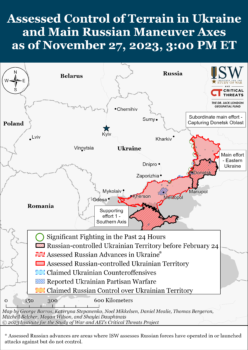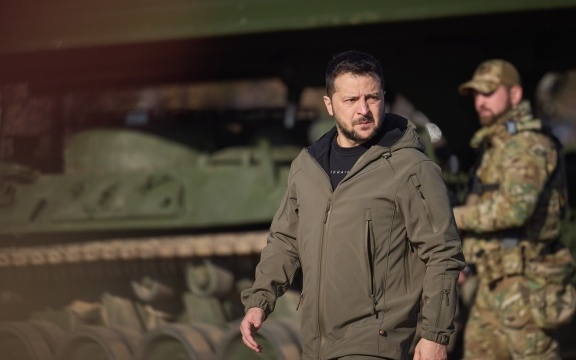Ukraine President Volodymyr Zelenskiy on the frontline in Kupyansk in the Kharkiv region, November 30, 2023
Thursday’s Coverage: Russia’s Chemical Weapons Setback

Map: Institute for the Study of War
UPDATE 1919 GMT:
The European Union’s foreign policy head Josep Borrell has derided the Russian Supreme Court’s ban on the “international LGBT+ public movement” as an “extremist organization” (see 0517 GMT).
Amid the decades-long crackdown on rights of LGBTIQ persons unleashed under President Putin, this decision aims at further persecuting the LGBTIQ community in Russia and aims to stifle civil society and those courageously defending human rights. This decision will prevent LGBTIQ persons from enjoying their human rights and dignity over fears of unjustified persecution.
The EU firmly opposes discrimination, prejudice and hate. We stand in solidarity with Russian citizens and all others who are adversely affected by this decision.
The EU urges Russia to stop the unfounded repression, to uphold its international obligations and to respect, protect and fulfil human rights without discrimination of any kind.
Russian State officials and propagandists have defended the ban.
Peter Tolstoy, Deputy Chairman of the State Duma, thundered, “This is a well-organized and well-planned project to undermine traditional societies from within….The law banning LGBT propaganda passed last year cut off many of the tentacles of this monster. But it is not the tentacles that need to be destroyed, but the entire monster.”
Russian TV has welcomed the decision to ban the ‘international LGBT public movement’:
MP Alexei Zhuravlyov is delighted & says the ban was only possible thanks to the ‘special military operation’
Host Artyom Sheynin voices approval: "We’re on the offensive on that front too!" pic.twitter.com/cjJdgRxQwP
— Francis Scarr (@francis_scarr) November 30, 2023
But Ekaterina Solovyova, the daughter of Russian State TV polemicist Vladimir Solovyov, broke ranks: “Even Orwell would be sick to his stomach by now….We recognize nonexistent organizations as ‘extremist’ but receive Hamas at the Kremlin.”
UPDATE 1909 GMT:
Switzerland has frozen an estimated 7.7 billion Swiss francs ($8.81 billion) in financial assets belonging to Russians.
The amount is a slight increase from the 7.5 billion Swiss francs blocked last year after Bern adopted European Union sanctions over Vladimir Putin’s invasion of Ukraine.
Another 300 people and 100 companies and organizations have been added to Switzerland’s sanctions list in the past year.
The Swiss have also blocked the movement of 7.4 billion francs in foreign currency assets belonging to the Russian Central Bank.
Ukraine President Denys Shmyhal posted:
🇨🇭🇺🇦Switzerland has frozen almost $8.8 bn of financial assets belonging to russians as part of the sanctions. Grateful to @alain_berset, @ignaziocassis for this important first step. Together with our partners, we are moving towards a mechanism to utilise seized assets for…
— Denys Shmyhal (@Denys_Shmyhal) December 1, 2023
UPDATE 1855 GMT:
Russia has suffered a second notable diplomatic defeat in three days.
Moscow failed to win election to the Assembly of the International Maritime Organization’s new council.
On Wednesday, the Russians could not secure re-election to the 41-member Executive Council of the Organization for the Prohibition of Chemical Weapons.
For much of Vladimir Putin’s 21-month invasion of Ukraine, Russia has tried to blockade Ukrainian ports and restrict shipping in the Black Sea and Sea of Azov.
Ukraine President Volodymyr Zelenskiy responded to today’s news:
The Assembly of the International Maritime Organization has just elected a new IMO Council for 2024-2025. Russia was not elected.
I welcome this just decision. In the last decade, no country has done more to undermine freedom of navigation than Russia.
I am grateful to IMO…
— Volodymyr Zelenskyy / Володимир Зеленський (@ZelenskyyUa) December 1, 2023
UPDATE 0839 GMT:
A Ukrainian official says operatives detonated four explosive devices overnight on a railway line in Siberia used for transport of Russian military supplies.
The blast targeted a cargo train was moving through the Severomuysky tunnel in the Buryatia region, bordering Mongolia.
Russian sources said a train had caught fire, but made no mention of explosives.
UPDATE 0832 GMT:
The Ukraine Air Force says air defenses downed 18 of 25 attack drones and one of two cruise missiles launched by Russia overnight.
There were no immediate reports of damage from the attack, launched from south-western Russia and Russian-occupied Crimea and was aimed primarily at eastern and southern Ukraine.
UPDATE 0517 GMT:
Russia’s Supreme Court has banned the “international LGBT movement” as an “extremist organization”.
Supreme Court Judge Oleg Nefedov issued the ruling on Thursday in a four-hour, closed-door session, with only Justice Ministry representatives allowed to attend. Journalists were summoned to hear the decision.
The Justice Ministry filed its lawsuit on November 17. It did not specify what is considered a “movement”, who is in it, or how it is organized.
Marie Struthers, Amnesty International’s Director for Eastern Europe and Central Asia, responded:
This shameful and absurd decision represents a new level in the Russian authorities’ campaign against the LGBTI community. It risks leading to a complete ban on LGBTI organizations, leading to far-reaching violations of the rights to freedom of association, expression and peaceful assembly, as well as the right to freedom from discrimination. This will affect countless people and the consequences could be catastrophic.
There is little doubt that this will lead to the persecution of LGBTI activists, undoing decades of their brave and dedicated work, while threatening to inspire and legitimize a whole new level of violence against LGBTI people across Russia.
She called on Russian authorities to “immediately reconsider this decision”.
Journalist Ksenia Sobchak summarized, “This is the most repressive and cruel law in recent years.”
When you come out, you go to the mines. You live with a partner of the same sex – [you go] to the mines. You listen to the group Tatu – to the mines. If you write an extremist prefix before the words “community” or “people” – to the mines.
Expect an even greater flow of emigrants, dear country.
Tikhon Dzyadko, editor-in-chief of the Dozhd TV channel, added, “This means that with the stroke of a pen, for the sake of cheap political points, the Kremlin has taken several million people outside the scope of the law and declared them criminals. Terrible.”
Moscow resident Anton, 33, said, “Although I was expecting something like this, I’m hurt to the point of tears. It’s humiliating and scary.”
UPDATE 0456 GMT:
Russian attacks on Thursday killed three civilians and wounded 12 in the Kherson region in southern Ukraine and the Donetsk region in the east.
One person was killed in Toretsk in Donetsk in the afternoon by Russian bombing. Six people, including residents aged 86 and 87, were wounded during the day by the bombs and by mortar fire.
In Sadove in the Kherson region, two men were slain. In Tiahynka, about 40 km (25 miles) east of Kherson city, three elderly civilians were injured. Other residents were wounded in Beryslav.
UPDATE 0446 GMT:
European Commission head Ursula von der Leyen says 480,000 artillery shells “have been either delivered or are in the pipeline” to Ukraine from the European Union.
EU officials have acknowledged that they will miss their initial target of providing 1 million shells by March.
Ukraine’s Foreign Minister Dmytro Kuleba has blamed “the poor state of the European defense industry” for the delay. An investigation by the Kyiv Independent and its partners cited the obstacles of bureaucracy and protectionism of individual countries.
Von der Leyen put a positive spin on the situation, saying the 1 million rounds will be produced each year from 2024: “This would have been unimaginable just two years ago. And it already marks a massive step forward for our defense cooperation.”
The reality is that we didn’t have sufficient ammunition and weapons available. No large stocks and a lack of spare capacity. Because in peacetime, we thought we didn’t need them. This needed to change.
Von der Leyen said the European Commission will present a new European Defence Industrial Strategy early next year.
With Russia’s invasion entering its second full winter, Ukraine President Volodymyr Zelenskiy visited frontlines in the east and south of the country on Thursday.
Accompanied by Defense Minister Rustem Umerov, Zelenskiy visited a command post in Kupyansk, about 100 km (62 miles) east of Ukraine’s second city Kharkiv. Kupyansk, liberated in September 2022, has been targeted for weeks by Russia as Moscow tries to reverse Kyiv’s counter-offensive in the neighboring Donetsk region in eastern Ukraine.
Zelenskiy’s office said he was briefed by Gen. Oleksandr Syrskyi, the commander of Ukraine’s military operations in the east. The general reported on the operational situation and his plan for further defense of the Kupyansk-Lyman axis. There were discussions about electronic warfare equipment, UAVs, protection against Russian drone attacks, and strengthening of fortifications.
Zelenskiy told troops:
I know that you are losing close people, your brothers in arms, every day. Everyone understands that this is the highest price. Therefore, I am asking you to protect yourself, protect the soldiers who fight alongside you every day.
I wish you victory, be strong, do not lose the initiative, and defend Kharkiv Oblast, Kupyansk, every village, every square meter of our land.
In the Zaporizhzhia region in southern Ukraine, Zelenskiy, Umerov, and Gen. Oleksandr Tarnavskyi discussed fortifications, operations, and plans. The President then presented soldiers with state awards.
Zelenskiy also met local officials. Talks included the construction of bomb shelters in Zaporizhzhia’s schools.
In his nightly address to the nation, he called for faster construction of fortifications in eastern Ukraine: “This of course means the greatest attention to the Avdiivka, Maryinka and other sectors in Donetsk region. In the Kharkiv region, this means the Kupiansk sector and the Kupyansk-Lyman line.”


Trackbacks/Pingbacks